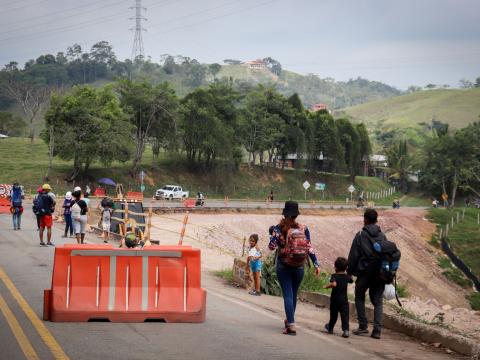
Economic Resilience “On-the-Move”: new tools to leverage local markets for basic needs through conflict-sensitive approaches
A special look at Cash and Local Markets for Social Cohesion
Local market actors affected by (natural) disasters, pandemic lockdowns with movement restrictions and income loss - generally in Fragile Contexts - play a critical role in contributing towards communities’ basic needs with goods and services (including in refugee settings). Local market actors are part of the community themselves and are therefore essential first local as well as continuous responders in sudden-onset and protracted crises and conflicts. Cash facilitates choice and provides a springboard for tailored financial assistance and financial inclusion – pointing to a more dignified choice over priorities and needs by clients as well as cost-efficiency, and not least – strengthening and connecting local markets local communities to recover from shocks.
For World Vision, having reached over 6.7 million people in 44 countries in FY21 through transfer - and increasingly beyond humanitarian Disaster Management sectors -cash and voucher transfers are close to 40% of our global modality portfolio. Furthermore, cash and voucher assistance is 20% more cost-effective than in-kind assistance. It strengthens local economic resilience and choice for vulnerable population, building local self-reliance despite and in the midst of a protracted humanitarian crisis. Local market actors and vulnerable customers/ buyers in this marketplace play a key role in maintaining and re-establishing economic resilience at household and community levels during and post-crisis – but they can also significantly undermine or inhibit communities and individuals from contributing to and benefitting from market activity in crisis contexts. Therefore, clarity on risk analysis, market mapping, market interaction, and conflict dynamics is paramount for effective leverage of cash and voucher assistance. Moreover, a systematic approach to ongoing monitoring of community and conflict as well as market dynamics also enables early warning of increasing inter-communal tensions, high price fluctuation and other potential risks to individuals interacting in the marketplace. Adaptive programming that is facilitated through CoSMAT, and, more specifically, the consideration of addressing immediate humanitarian needs (to survive) by building local market and community recovery and resilience, stability and capacity (to adapt), helps to also address root causes of socio-economic tensions and can contribute towards transforming communities (to thrive) where possible, in line with World Vision’s fragile context framework.
CoSMAT has been developed by World Vision’s Fragile Context Peacebuilding and Disaster Management/ Cash Voucher Teams and brings key considerations of conflict and market analysis tools1 into one practical field application for field frontline staff. It consists of a simple 4 step process to collect information, conduct analysis, map key risks and develop mitigation and joint action plans between World Vision teams, community members, local market actors and government representatives. It also uses local market interaction and market-based programming such as cash voucher assistance to strengthen social cohesion instead of feeding into divisions.
World Vision Colombia has tested the tool in its Venezuela migration crisis response. Norte de Santander is a complex social, economic, and political context, comprising many stakeholders with different interests and objectives. Existing manuals and methodologies were considered insufficient to analyse the market dynamics and their relation with existing social conflicts, local economic constraints, and intra-household dynamics. Thanks to the CoSMAT analysis, World Vision Colombia developed a better understanding of the market contexts and the possible risks generated by their actions on the field. Furthermore, it has helped to inform the needs assessment exercises conducted periodically in the areas of intervention and highlighted key risks and issues that require additional advocacy efforts, including engagement with local market vendors from whom migrants and refugees that received Cash and Voucher Assistance would buy their daily supplies from hygiene articles, to food and household items. Finally, participation of social civil society actors in the context analysis became a priority for the teams in the field due to their support in identifying relevant warning signs, trigger thresholds and mitigating actions.
For our team and partners, CoSMATool helped to identify and monitor the number of incidents of violence against migrants (including physical assaults and attacks on property) as well as the number/frequency of threats or violent incidents affecting certain population groups (for example, female-headed households, people with disabilities). World Vision designed a strategy to measure progress in the Colombia risk mitigation plan, including the participation of actors from social civil organisations, the market place and local Government to ensure different point of views. They were able to detect any early signs of potential increase of violent behavior in communities and intra-household and market interactions, as well as mitigate perceptions and attitudes that could undermine community solidarity. Instead, it focused on enhancing open communication, improved awareness on who was receiving what assistance and why as well as opportunity to suggest strategies to vendors and buyers, humanitarian actors regarding programme adaptations for market price fluctuations.
CoSMAT was also tested by World Vision Afghanistan in 2021, Risk mitigation and social cohesion activities were derived from this analysis and adapted to fit context and consider cultural sensitivities.
The role of leveraging local markets to address basic needs of most vulnerable children and their families continues to be implemented and scaled up by World Vision in Philippines/ Mindanao and World Vision Myanmar programmes as well – jointly with partners using conflict-sensitive and adaptive programming more holistically and effectively, to not only survive protracted complex humanitarian crises, but adapt and thrive, giving hope and building a future for families and their children in and through the market place.
Kathryn Taetzsch is World Vision's Global Director, Cash Voucher Programmes & Marieta Fitzcharles is World Vision'sCash and Voucher Assistance Advisor Monitoring Evaluation Accountability and Learning (MEAL) Disaster Management
--------
(1)Tools include:
-
Good Enough Context Analysis for Rapid Response (GECARR);
-
Integrating Peace Building And Conflict Sensitivity (IPACS);
-
Making Sense of Turbulent Contexts (MSTC);
-
Rapid Assessment for Markets (RAM);
-
Minimum Standard for Market Analysis (MiSMA);
-
StopLight
